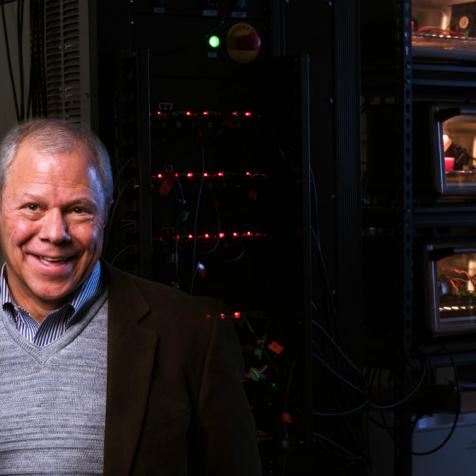
Company Details
Location
Broomfield, Colorado
Founded
2014
Ownership Type
Private
Employees
6
Products
Lithium-ion battery technology
Broomfield, Colorado
Founded: 2014
Privately owned
Employees: 6
Industry: Energy & Enviro
Products: Lithium-ion battery technology
The startup is working to significantly improve lithium-ion batteries for use in the electric vehicle (EV), consumer electronics, and niche aerospace industries.
Even with the shortcomings of our grid infrastructure, "today's plug-in electric vehicles (PEVs) can 'fuel' for the equivalent of about $1 per gallon," reports the United States Advanced Battery Consortium (USABC). EVs also reduce carbon emissions by 54 percent -- a figure which will only improve as grid-generation becomes cleaner. Yet battery storage remains the largest impediment to greater adoption of EVs and renewable energy in general.
SiILion is developing electrochemical energy storage technologies to significantly extend the capabilities of lithium-ion (Li-ion) batteries, without requiring supply chain or manufacturing overhauls. The firm has been awarded five Small Business Innovation Research (SBIR) grants, totaling over $2.1 million in value, from the U.S. Navy, Department of Energy and National Science Foundation.

"SiILion is a rapid commercialization and extension within existing lithium-ion ecostructure and manufacturing supply chains," explains Ed Williams, the company's acting CEO and chairman of the Colorado Cleantech Industries Association. "So it has a much shorter path to commercialization than the next-generation, solid-state technology."
He continues, "The essence of the innovation the company has is to really enable the lithium-ion industry to successfully move towards the advanced materials they've been attempting to embed and commercialize for the last 10-plus years. And it's essentially a higher component of silicon material in the anode and a very high component of nickel in the cathode."

While silicon has 10 times the capacity of graphite currently used in battery anodes, it expands three-fold during charge cycles. This has prevented its widespread adoption, but Williams reports that SiILion has developed additives for the silicon anode which preserve the battery cell's physical and architectural integrity. Chemical additives also improve the nickel cathode's thermal stability. Finally, SiILion uses a non-flammable liquid electrolyte, in contrast to the flammable carbon electrolyte now used in Li-ion batteries.
Taken as a whole, these will yield dramatic increases in cycle life, energy density and other dimensions of performance, using less costly materials. SiILion's first generation pouch format cells are 350 watt-hours per kilogram (Wh/Kg) and 750 Wh/liter. As a point of reference, the gravimetric power density of commercially available Li-ion batteries is well below 285 Wh/Kg. The firm's first generation cylindrical cells will soon be scaled and available for commercial evaluation as well.

Prospective partners are now testing the technology independently. "[S]caled prototypes on very traditional manufacturing operations and equipment validates the ease with which this could be brought up in the existing supply chains," Williams notes. "Our business model is really to license the cell designs and technologies to the existing product and manufacturing companies. Because of its ease of fit and integration into their existing markets and existing manufacturing lines it's very, very conducive for a licensing model. So [that] precludes us from needing to build our own costly and very expensive manufacturing operations."
SiILion's path to commercialization is likely to begin with specialty energy storage applications for niche aerospace (e.g., drones), as well as "mobile warrior" applications. From there, Williams anticipates adoption in consumer electronics/mobile products, which could optimistically take effect in about 18 months.

Williams recons that many OEMs will ultimately want next-gen technologies like the solid state batteries Prieto and Solid Power are developing, but Li-ion batteries will remain essential for decades. SiILion's technologies aim to help battery makers to keep pace with markets.
"We really allow, for example, the transportation industry to jump to a higher performance in energy density, less thermal issues and more safety, and to lower their costs. And we do this without disrupting the existing supply chains, equipment or processes that are in the manufacturing ecosystem today."
SiILion is in discussions with automotive companies in Asia, Europe and North America. In the transportation industry, SiILion's technology "has the potential to be rolled out within 24 months subject to refined engineering on both [charging] rate and cold temperature performance," says Williams.

SiILion aspires to meet or exceed the U.S. Automotive Battery Consortium's target objectives for EV battery performance. The USABC was founded in 1991 by the "big three" American automakers "to develop electrochemical energy storage technologies that support commercialization of electric drive vehicles," according to the organization's website, which also details its EV battery goals.
Challenges: "I think certainly getting a timely close on the equity raise is priority one because the demand is so strong," says Williams. The equity fundraising round will facilitate in-house rapid prototyping, greater control of production and timing, and the purchase of $250,000 to $500,000 of new equipment.
On the technical side, challenges include increasing cold temperature and power performance, he adds. "Today that's the limiting factor, on both temperature and power, is the electrolyte. We've . . . gotten some good affirmation of additives that we can modify the formulation with in the lab. We need more robust testing and refinement of that."

Opportunities: Williams points to aviation and defense as initial target markets, citing opportunities for commercialization as soon as early 2018. "Right behind that, with pretty well recognized consumer brand names, we've got a solid opportunity to enter those markets pretty quickly as well," he adds
Needs: "Extending the A-team caliber of folks that we've got," says Williams, highlighting needs for battery-manufacturing consultants and applied engineering staff.
